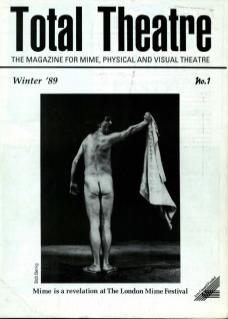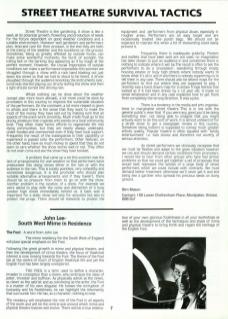Street theatre is like gardening. A show is like a seed; all its potential growth, flowering and production of seeds for the future dependent on good weather conditions and a suitable environment. However well gardeners and performers plan, tend and care for their produce, in the end they are both at the mercy of the weather and the conditions on the ground. Sometimes, being so greatly affected by outside forces can make some wonderful moments: the burst of sunlight, the tolling bell or the barking dog appearing as if by magic at the perfect moment. However, the crucial importance of outside conditions can make a performance impossible: this summer we struggled through a show with a rock band blasting out just down the street so that we had to shout to be heard. A drunk ploughed through the audience knocking the instruments over, some kids started playing our drums during the show, and then a light drizzle turned into driving rain.
Whilst nothing can be done about the weather (except plan more tours abroad), a lot more could be done by promoters in this country to improve the vulnerable situation of the performers. On the continent, a lot more respect is given to artists and there is the sense that they want to make the most of the money they have laid out by making sure that all aspects of the event work smoothly. Much credit must go to the plucky amateurs that organise arts events on a local community level. They often make heroic efforts to regenerate life within dying communities, but they are nearly always underpaid, underfunded and overworked, even if they have local support. Frequently, the result of the inadequacies in their capability or experience is passed onto the performers. Other festivals, on the other hand, have so much money to spend that they do not seem to care whether the show works well or not. They often do not even come and see the show they have booked.
A problem that came up a lot this summer was the lack of arrangements for wet weather so that performers were pressurised into doing shows either in the rain or with the audience in the rain. This is totally pointless, very unhealthy and sometimes dangerous. It is the promoter who should plan suitable alternative arrangements and if they haven’t, there should be no pressure from them to go on with the show. Another problem is the location of a show. For example we were asked to play with the noise and distraction of a busy London high street immediately behind us. A back wall is important for a static show not only for acoustics but also to protect the props. There should be stewards to protect the equipment and performers from physical abuse, especially in rougher areas. Performers are an easy target and are occasionally treated like punch bags. We should not be expected to tolerate this when a bit of stewarding could easily prevent it.
Frequently, there is inadequate publicity. Posters and leaflets that have been sent are not used, no imagination has been shown to pull an audience in, and sometimes there is nothing to indicate where it will be. The result is often to ask the performers to ‘do a procession’, wandering through empty housing estates or busy high streets where nobody wants to know what it’s all in aid of and there is nobody supporting us to tell them in any case. There should also be decent maps for the performers to find out where they are supposed to play. I recently saw a hand drawn map for a certain fringe festival that looked as if it had been drawn by a twelve year-old. It made no sense whatsoever and in any case explained how to get there from completely the wrong direction. It was a joke.
There is a tendency in the media and arts organisations to marginalise street theatre. This is in line with the general public’s view that if you were any good you’d be doing something else not being able to imagine that you might actually want to do this sort of work. It is almost unheard of for a street show to get a newspaper review in this country. Somehow being indoors is supposed to convey much greater artistic quality. Popular theatre is often equated with ‘family entertainment’, i.e. kids shows and therefore not worthy of serious attention.
As street performers we obviously recognise that we must be flexible and adapt to the given situation however we can, and should demand certain conditions from promoters. I would like to hear from other groups who have had similar problems so that we could get together a set of proposals that would best represent the wishes of a large body of street performers which we could include with contracts. We must demand better treatment otherwise we’ll never get it and end up being like a gardener who spreads his precious seeds on stony ground.

